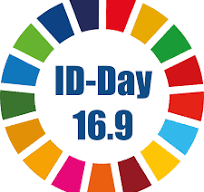



International ID Day, observed on 16 September, is a global initiative aiming to raise awareness about the fundamental human right to legal identity. This annual event is anchored in the United Nations Sustainable Development Goal (SDG) 16.91, which seeks to provide legal identity for all, including birth registration, by 2030.

As a policy-driven initiative, ID Day highlights the role of digital identity systems in addressing global socio- economic challenges and emphasises the need for robust, inclusive identity management solutions.
The underlying rationale for International ID Day is straightforward: identity is a human right and a prerequisite for accessing a wide range of critical services.
According to the World Bank2, more than 1 billion people worldwide lack any form of legal identification. This invisible population often struggles to gain access to education, healthcare, financial services, and voting rights. The absence of legal identity disproportionately affects vulnerable populations, including women, children, refugees, and migrants, creating a systemic barrier to economic participation and social integration.
Digital identity solutions, particularly those grounded in biometrics and secure technologies, present a way to address these challenges. Modern identity systems allow individuals to establish their legal identity, enabling them to access public and private services. International ID Day highlights the importance of ensuring these systems are inclusive, secure, and scalable to meet the needs of populations worldwide.
The event serves as both a celebration and a reminder of the ongoing efforts in digital identity innovation. The day is marked by various activities and campaigns that aim to raise awareness of the importance of legal identity and the progress made in identity technologies. Stakeholders from governments, non-governmental organisations, and the private sector join together in global campaigns that underline the importance of secure, inclusive identity solutions.
One notable initiative associated with this day is the ‘I Am Visible’ campaign, which shines a light on individuals who have been empowered by digital identity systems. It tells stories of individuals and communities who have gained access to essential services through legal identity, reinforcing the message that identity systems must be inclusive and accessible to all, regardless of social or economic status.
In addition to awareness campaigns, ID Day serves as a platform to recognise the advances in technology that facilitate legal identity. The convergence of artificial intelligence, biometrics, and cryptography has enabled identity systems to become more reliable, scalable, and secure, driving home the point that innovation is key to achieving SDG 16.9 by 2030.
Since its inception, International ID Day has garnered increasing global recognition, with numerous countries, organisations and advocacy groups acknowledging the importance of legal identity. The day has been instrumental in fostering international collaboration on identity projects, encouraging partnerships between public and private sectors to develop infrastructure for digital identity. The success of ID Day is measured not only by the awareness it raises but by the tangible progress it has driven in policy discussions and technological innovation.
One of the most significant outcomes of International ID Day has been the increased focus on inclusion. By highlighting the stories of those who have gained access to legal identity, the event underscores the transformative impact that identity systems can have on lives. Governments and international bodies have started to prioritise legal identity as part of broader development goals, recognising that identity is a crucial lever for achieving socio-economic development.
While many companies have individually taken steps, there is still a need for the secure identity industry to rally behind the goals of International ID Day. The path to providing legal identity for all requires sustained effort, investment, and collaboration across sectors.
No single entity can solve the global identity challenge alone. Public-private partnerships are crucial to developing the infrastructure, policies and technologies necessary to provide legal identity for all. The industry must continue to collaborate with governments, international organisations and NGOs to ensure that identity systems are interoperable and respect the privacy and rights of individuals.